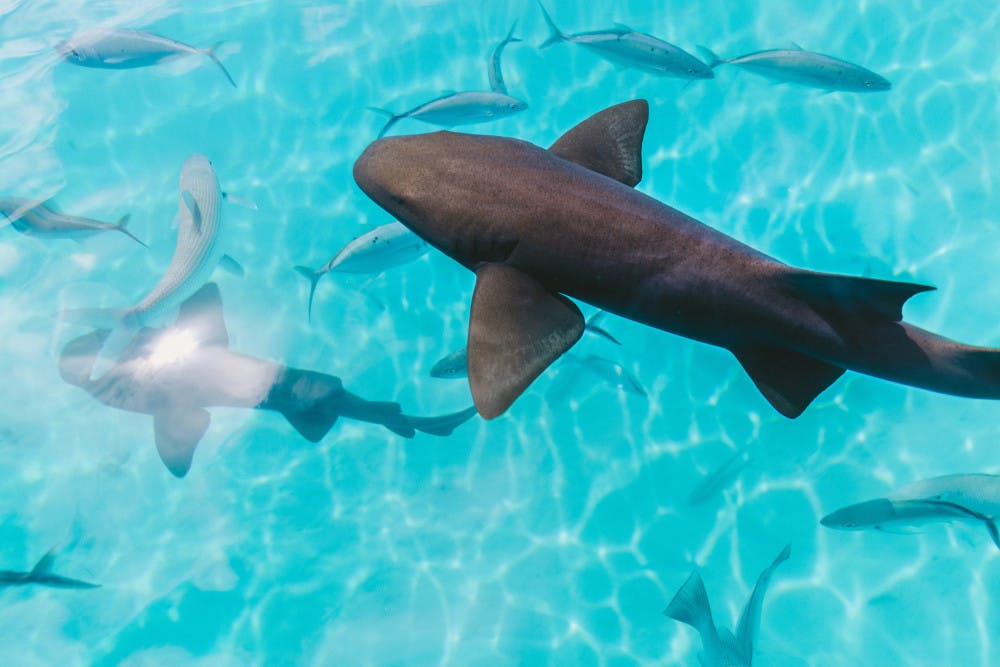Sharks shouldn’t be a worry for springbreakers this year.
In a study released Jan. 28, UF researchers found unprovoked shark attacks worldwide dropped to 66 incidents last year, which is 26 percent less than the 88 recorded incidents in 2017. The most recent five-year average reported about 84 incidents annually, said Gavin Naylor, the lead researcher of the study, UF biologist and Director of the Florida Museum of Natural History’s shark research program.
Blacktip sharks, a species of shark named after the black tips on their fins, are responsible for most bites in southeastern United States, where researchers have seen the largest decline, Naylor said. The reason Blacktips have not been biting as frequently this year might be related to the rising water temperatures from global warming, causing a decline in the population.
An incident is defined as an unprovoked attack from a shark, Naylor said. Only four incidents this year were fatal compared to six fatal attacks recorded last year.
Most shark bites are accidental, Naylor said. Sharks could mistake people flailing their arms and kicking their legs for fish.
“Because these sharks act on instinct and have to be fast, they turn around and bite people immediately,” Naylor said.
This research was conducted as part of a 20-year study dedicated to recording every unprovoked shark attack worldwide, Naylor said.
The shark research program collected data through the collaboration of teams in other areas such as Australia, South Africa, Hawaii and Brazil that all report international shark attacks into one database, UF’s International Shark Attack File, Naylor said.
There’s been a steady pattern of a decline in shark incidents over the past 20 years, but it’s important to look into why it has declined so suddenly, Naylor said.
“As biologists, we like to understand why animals do what they do,” he said.
Naylor said he hopes this research will help erase people’s phobia of sharks and help increase understanding of them.
“The best thing to alleviate fear is knowledge,” Naylor said. “People need to understand that we share the world with these animals and try to integrate our behavior so we can live alongside them.”
Samson Eagen, a 19-year-old UF nursing freshman and UF Surf Club member, said he thinks about sharks every time he gets in the water after he was bumped off his surfboard by a 4-foot bull shark last year.
Eagen said it’s important to stay cautious in the water but not fear sharks themselves.
“The odds are that you’re as big, if not bigger, than any shark you’re in the water with,” he said. “They probably aren’t going to bother you unless you somehow pique their interest.”
Jenna Knobbe, a 19-year-old UF environmental management in agriculture and natural resources freshman, aspires to pursue a career in shark conservation. The study is great news to her because it solidifies what she has always known: Sharks don’t want to eat people, and only bite people because they are just curious.
Without sharks eating other fish, the prey species would overpopulate and mess up the oceanic food chain, Knobbe said.
“You should be afraid if you are in the ocean and don’t see sharks,” she said. “People don’t realize how vital sharks are to our marine ecosystems, and without sharks it would all collapse.”





![Photo of the missing Leachianus “Leachie” gecko. [Photo courtesy of Mike Southwick]](https://snworksceo.imgix.net/ufa/907bd92a-0b29-40eb-a5fb-d7db7cf98b2f.sized-1000x1000.jpg?w=1500&ar=16%3A9&fit=crop&crop=faces&facepad=3&auto=format)
